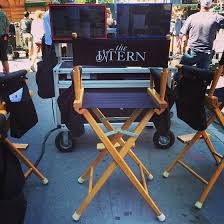Stories always need to be good in some way in order to deserve being adapted into films, although this is sometimes not the case these days.
A strong script is the infrastructure which all enduring films require and is at the basis of every successful story.
To achieve this, a powerful array of characters is needed along with a believable interaction between them, and most importantly a viable build up of their relationships. Simply put we need to believe in how they feel towards and act with one another on screen.



Meyers has a magical way of weaving a web of interplay between characters, in a natural and convincing way, leading them to build real and lasting relationships with one another.
All of this she manages to achieve within just a couple of hours of screen time.
This is a skill rarely found because usually we find the players suddenly moving to another dimension in their interactions, without any real emotional connection previously, or any actual believable build up.That is the successful formula, which makes this film, like many others of hers, a treat to watch.
It is a production which is both funny and sad at the same time, and although simple as a plot, still extremely enjoyable. It is an 'easy' type of viewing experience, as well as being a genuine film with sincere characters.
In contrast to this, films such as: 'The Martian' (previous post) look at the camera as a technical tool and as directly involved in the life of the actors/characters on screen. In such films, as the latter, the camera is seen as a priority tool of the film making process, even to the point of cameras being shown actually rolling in real time within the film itself.
This technique, of showing the camera in action within the movie, reminds us of the power and strength of the film reel as a life giving tool, through its images.
Experience really doesn't ever get old, and although De Niro may have aged, he certainly knows how to be cast in the right roles for his time of life.
Lots to learn from 'The Intern'.


A strong script is the infrastructure which all enduring films require and is at the basis of every successful story.
To achieve this, a powerful array of characters is needed along with a believable interaction between them, and most importantly a viable build up of their relationships. Simply put we need to believe in how they feel towards and act with one another on screen.
Nancy Meyers is an old time favourite of many because of her ability to present us with emotionally developed characters through her writing and directing, and she does this beautifully once again in her latest: 'The Intern', starring De Niro and Hathaway.
The characters have emotionally complex profiles and believable relationships with one another, ranging from the decent father figure (De Niro), to the aspiring, ambitious young working mother (Hathaway), to her seemingly emasculated yet ultimately loving, understanding and regretful husband, even to the co-workers at the company which she has established.
Meyers has a magical way of weaving a web of interplay between characters, in a natural and convincing way, leading them to build real and lasting relationships with one another.
All of this she manages to achieve within just a couple of hours of screen time.
This is a skill rarely found because usually we find the players suddenly moving to another dimension in their interactions, without any real emotional connection previously, or any actual believable build up.That is the successful formula, which makes this film, like many others of hers, a treat to watch.
It is a production which is both funny and sad at the same time, and although simple as a plot, still extremely enjoyable. It is an 'easy' type of viewing experience, as well as being a genuine film with sincere characters.
The themes explored are: parenthood, role reversal between men and women in the work place and at home, as well as love, relationships and adultery.
The deeper themes are perhaps linked to concepts of trust and of the boundaries in relationships depending on the individuals involved.
From a filming point of view this is a movie where the camera takes second place to the characters and perhaps this is still how it should be when a real story of emotions is told.
In contrast to this, films such as: 'The Martian' (previous post) look at the camera as a technical tool and as directly involved in the life of the actors/characters on screen. In such films, as the latter, the camera is seen as a priority tool of the film making process, even to the point of cameras being shown actually rolling in real time within the film itself.
This technique, of showing the camera in action within the movie, reminds us of the power and strength of the film reel as a life giving tool, through its images.
As to 'The Intern', the title gives a feel of the film. The casting is very well executed; the right faces for the right characters, and the feeling throughout is one of teaching and learning, therefore the title.
Experience really doesn't ever get old, and although De Niro may have aged, he certainly knows how to be cast in the right roles for his time of life.
Lots to learn from 'The Intern'.
No comments:
Post a Comment